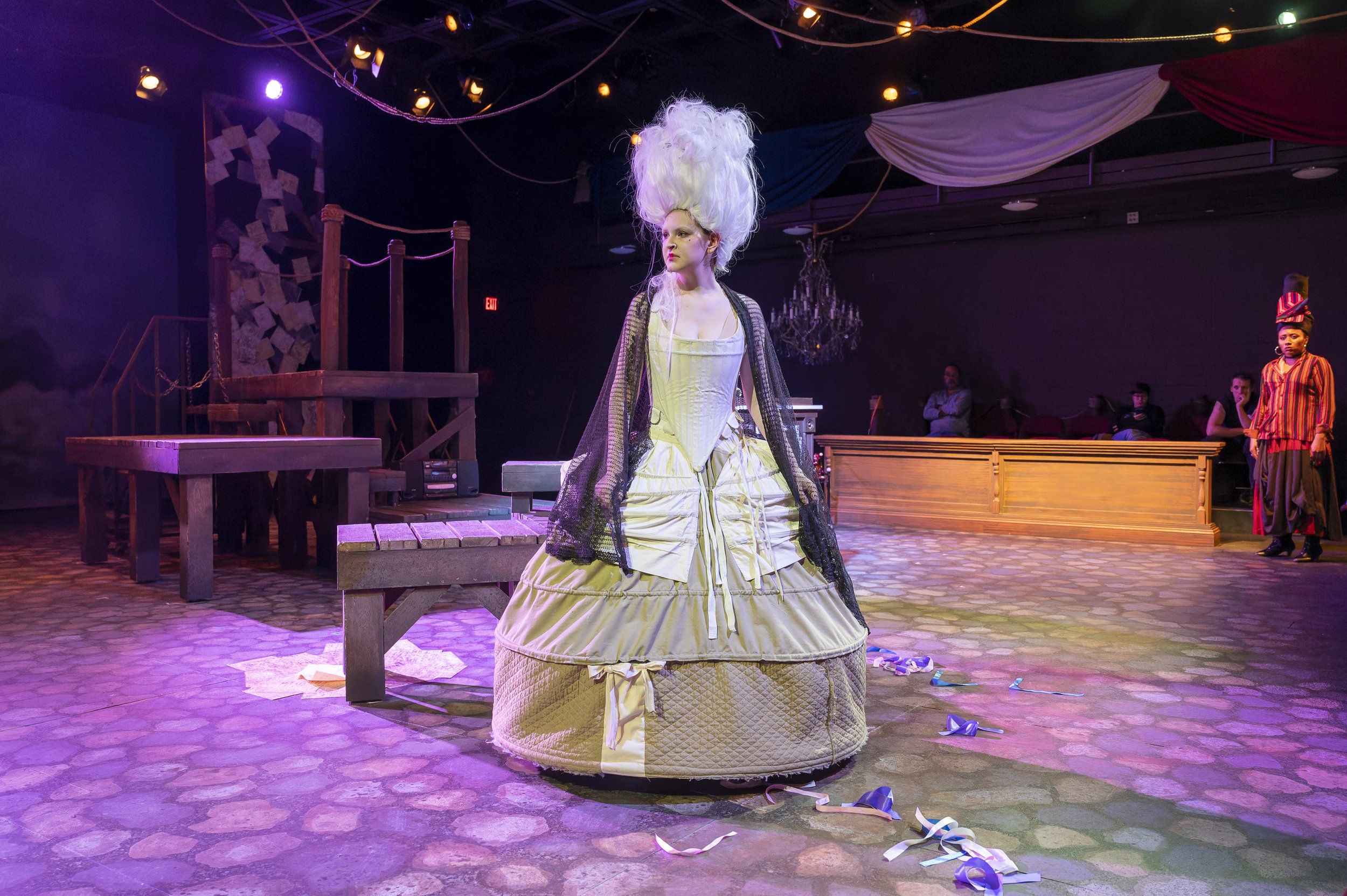The Revolutionists
by Lauren Gunderson
presented by Illinois Theatre
Krannert Center for the Performing Arts, Studio Theatre
November 5-13th 2022
Director
Scenic Designer
Costume Designer
Lighting Designer
Sound Designer
Technical Director
Scenic Charge
Properties Heads
Production Manager
Stage Manager
Nisi Sturgis
Will Sexton
Hetag Tsabolov
Kyle Wurtz
Sarah Calvert
Ryan Schultz
Kate Spademan
Bridgette Dona, Kenneth W Church
Julia Colpitts
Meghan Kegeris
photo by Will Sexton
Cast
OLYMPE DE GOUGES
CHARLOTTE CORDAY
MARIE-ANTOINETTE
MARIANNE ANGELLE
u/s CHARLOTTE CORDAY / Ensemble Crew
u/s OLYMPE DE GOUGES / Ensemble Crew
u/s MARIE ANTOINETTE / Ensemble Crew
ENSEMBLE CREW
Lauren Ashley Hayes
Kim Fernandez
Vivien Cohen
Noelle Moriah Klyce
Cocoa Afonso
Gina White
Gracie Benson
Konstanza Stormont, Madelyn Childress, Evan Arnold
photos by Darrell Hoemann
Director’s Notes
So, the “revolution” the title of this play refers to is the French one back in the late 1700s. That blade in the air is made for a guillotine (gee-oteen if you want to sound all French about it), which is a method of execution that got verrry popular in that particular time and place.
It’s pretty secure up there. I wouldn’t worry about it.
The ”-ists” the title refers to are four women. You may recognize some of them from your history classes. You may not.
A thing about a big revolution like the French one:
One person’s treason is another person’s liberty.
One person’s murder is another person’s capital punishment.
One person’s insanity is another person’s genius.
It depends on who wins.
History, as they say, is written by the victors. And the victors are, historically, men. So women are, historically, foutues.
Especially the revolutionary ones. The radical, subversive, insurgent, rebellious, rioting, anarchistic, defiant, disobedient women are all too easily labeled crazy, emotional, weak, slutty, bitchy, hormonal, hysterical, irrational by those who fear them. They are dismissed and forgotten or remembered as cautionary tales or—worst— punchlines.
Still, history is not set in stone. When new facts emerge, it gets revisited.
Contexts become evident, complexities are unraveled, and legacies are recast.
Anyway, you aren’t in a history class—you’re in a theater. You’re here to see and hear a story. Why? Were you dragged? Did you think it’d be fun? Are you starting to worry you’ve made a horrible mistake? Did you think something interesting might happen: you might be entertained, surprised, moved? Did you think this play might matter? Does it matter?
You’re in Urbana, Illinois in 2022 watching a made-up play about four women in eighteenth-century Paris. So what? It’s funny— one of the characters is a playwright wondering if her work can make a difference (in a play written by a playwright wondering if her work can make a difference).
We are not in control of our legacies, no matter how much we try with famous last words, names on buildings, memoirs, wills, curated social media pages. In the end, once we’ve sailed off, it isn’t up to us what we leave in our wake. It’s up to the people who tell our story.
The fact is, we are in a constant state of revolution, of growth and change—sometimes violent, sometimes gentle, sometimes great, sometimes nearly imperceptible, sometimes French, sometimes not-so-French. That kind of revolution gets helped along by stories like this one that might entertain, surprise, move you. So, in whatever way, this story will be part of your revolution, your change, and the histories of these women will then be written by you.
And that matters.
Revolutionists Playlist
Articles & Interviews
Illinois Theatre’s Revolutionists Production Team Video Interview
Nisi Sturgis, Noelle Klyce, Khetag Tsabolov, Sarah Calvert and Will Sexton
-
The Revolutionists considers how we actually go about changing the world
Kathleen McGowan, Smile Politely
by Owen Coughtry













